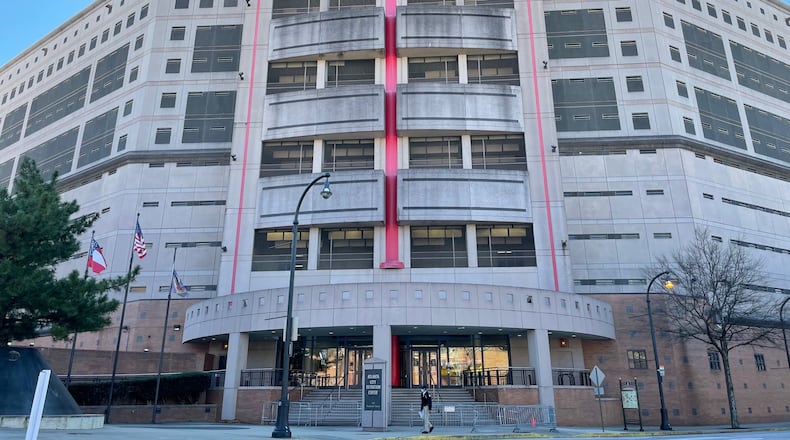Fulton County has been trying for the past two decades, on and off, to buy the city’s jail, but those talks have fallen through time and again. The city’s current mayor, Andre Dickens, also has no plans to transfer the facility to the county, a spokesman said.
The county Sheriff’s Office leases part of the city jail now, with restrictions on the types of inmates who can be housed there. Some Fulton County leaders believe that owning it would help the Sheriff’s Office manage its inmate population more safely and humanely. That seems ever more important since a new report on the Fulton County Jail by the Department of Justice was released last week, describing a hellscape where “people move through the walls” to attack others and noting that county Sheriff Patrick Labat has acknowledged that inmates “are literally crafting shanks from the crumbling walls of the dilapidated facility.”
Meanwhile, a coalition of advocates for criminal justice reform sent a letter this month to Fulton County commissioners warning that their desire to acquire the city jail is misguided, that doing so would exacerbate mass incarceration in the community. The letter also says Labat wouldn’t have the staff to manage the entire city jail and notes that he’s already under scrutiny for his handling of county funds.
“To follow this path requiring a new facility without adequate staffing is just dangerous,” said Michael Collins, senior director of Color of Change, a racial justice organization that signed the letter. “We know that the sheriff doesn’t have currently enough staff for the facilities he currently runs. We know the DOJ report highlighted huge staffing issues that led to death and violence, so why would you acquire another facility with no staff attached to it? It doesn’t make any sense.”
Credit: TNS
Credit: TNS
It is unclear whether last week’s release of the DOJ’s findings will change the mayor’s political will to hand over the city jail.
On Wednesday, Fulton County staff asked commissioners to decide whether to include in their 2025 legislative agenda support for a state Senate subcommittee’s recommendation that the city “immediately” transfer its jail to the county. But Board of Commissioners Chairman Robb Pitts decided to postpone the issue to a later meeting after he abruptly said: “We’re having some discussions with the mayor about this; it’s a sensitive topic now.”
Pitts did not elaborate and a spokesman for Mayor Dickens did not immediately respond Wednesday night or Thursday morning to a request for more information about the discussions.
In response to the DOJ’s findings, Dickens released the following statement: “This is an extremely bad report about the county jail, to say the least. As I’ve said before, the people of Fulton County deserve to be treated humanely at all times — including when in custody. They also deserve the right to a fair and speedy trial. This report highlights the failures to do so. Fulton County and its Sheriff must take swift, deliberate action on all of the DOJ recommendations to solve this humanitarian crisis.”
Regarding the city jail, which is formally called the Atlanta City Detention Center, and ACDC for short, the mayor’s press secretary noted that the city has provided space in the facility for the county to use, but that the county is not filling it.
“The City provided relief for county inmates via ACDC because it was the right thing to do and the County still has unused beds at their disposable,” city spokesman Michael Smith said in an email. “We have no plans of selling ACDC and the City of Atlanta encourages Fulton County leadership to explore alternatives to alleviate this humanitarian crisis.”
The Atlanta City Detention Center is a 471,000-square-foot building in downtown Atlanta. Of that space, about 12,000 square feet houses a new pre-arrest diversion center designed to keep people out of the notoriously overcrowded Fulton County Jail for nonviolent and minor offenses.
The jail portion of the facility has about 1,300 beds, and the city houses a daily average of 40 to 60 people there who are accused of violating city ordinances, said city councilman Dustin Hillis, cochair of the Justice Policy Board that oversees the diversion center.
The county Sheriff’s Office also houses nearly 400 inmates in the city jail (144 males and 247 females, as of Nov. 1). Under the lease agreement signed in December 2022, the Sheriff’s Office can house up to 700 total inmates there when the county jail exceeds its capacity. They must all be adults.
Hillis said he doubts that buying the city jail would “magically solve” the county’s problems.
“They haven’t even fully utilized the 700 beds at any time that they’ve been allowed to rent, because of their staffing issues,” the councilman said.
Fulton County Superior Court Judge Robert McBurney, the other cochair of the Justice Policy Board, said the concerns among justice reform advocates that expanding jail space could lead to more incarceration are “understandable.”
He added, though, that the county’s ownership of the city jail would be “an awfully savvy solution to the conundrum the county faces with a deteriorating jail that historically has been overpopulated.” He added that the city jail is “purpose-built for detaining people pre-trial” and is a short distance from the county courthouse, noting that transporting inmates longer distances “is a dangerous business.”
He said that because of the restrictions in the current lease, the Sheriff’s Office can’t move, for instance, a 17-year-old inmate to the city jail. That means such minors must be kept separate from adults, inside the county jail.
“If you have only one 17-year-old in the Fulton County Jail, he has to have a pod all to himself because the only other people who can be housed with him are other 17-year-olds,” McBurney said. “And if that pod has 15 beds, that means that one inmate is taking up 16 beds in the jail.”
“ACDC is a better place to have all of the young men who need to be housed together because they’re young and vulnerable to things that are going on in a big jail,” he added.
Chairman Pitts of the Board of Commissioners added that obtaining the city jail would reduce the need for the Sheriff’s Office to outsource inmates to facilities in other jurisdictions, including Cobb County.
“My position has always been that we need the (city) jail, and we’ve needed it probably three or four mayors back, when Shirley Franklin was mayor,” Pitts said in an interview earlier this month. “That’s one thing we all agree on, that we need that jail.”
As to the argument by criminal justice reform groups that Labat is unfit to oversee expanded jail operations, Pitts said he has “issues with how he manages the jail” but that the need for more bed space trumps those concerns.
“We just need it,” he said, “and I’m prepared to write a check for the jail or have them give it to us.”
Labat, who worked at the city jail for 31 years and retired as its chief in 2019, declined a request to be interviewed on the issue.
About the Author
Keep Reading
The Latest
Featured




